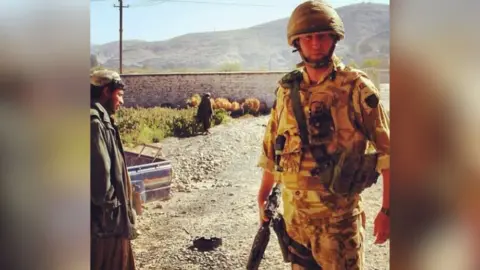Former UUP leader 'beaten badly' in Army for being Irish
 BBC
BBCThe former Ulster Unionist Party leader Doug Beattie has said he was "beaten badly" by instructors for being Irish when he joined the Army at the age of 16.
Beattie became a soldier in 1982 and served three tours in Afghanistan with the Royal Irish Regiment (RIR).
Originally from Portadown, County Armagh, Beattie became a UUP assembly member (MLA) in 2016 and was leader from 2021 until last year, after an internal row prompted his resignation.
He said bullying he endured during his early years in the armed forces had a huge impact on his life.
Speaking to BBC News NI's Red Lines podcast, Beattie said he joined the military as a teenager, after his mother died and his father struggled with alcohol addiction.
He said he went to Somerset to do his initial Army training, where he faced discrimination because of his background.
 Doug Beattie
Doug Beattie"Because I was an Irishman - and I've always been an Irishman - I was beaten badly by instructors, by people I was looking up to," he said.
"I found myself bullied quite badly, it doesn't matter that I was a unionist or my father was a military man.
"The fact I came from Northern Ireland meant I found myself being bullied and beaten quite a lot and that had an effect on my life as a young man."
Women at Stormont
Beattie also spoke to the podcast for the first time about how the furore over his resignation as party leader unfolded last summer.
He stepped down as leader after an internal row over the selection contest to replace Robin Swann as the UUP's North Antrim MLA after he became the MP for South Antrim.
Beattie said he had wanted a female candidate to replace Robin Swann, saying the party had a "lack" of women in high-profile jobs at Stormont, and that he was "prevented" from bringing in another candidate he preferred over Colin Crawford, who was selected by the party's North Antrim association to take on the role.
The Upper Bann MLA said when that happened, he felt it was "clear I could no longer influence the party".
"People who weren't supporting me made what I was doing really difficult to stay on... the truth was I had no choice," he added.
"I put in a letter of resignation, I didn't go to anyone I just went to the party chair. Then I was persuaded by the MLA group to withdraw it, I went back to withdraw and the party chair said no, they put it to party officers who said 'we're not letting you withdraw it, the letter stands'.
"The bottom line is I stepped down, I found my place back in the party as an MLA and that's where I'm working now."
Beattie admitted the affair had left him "bruised" after three years in charge, but said he would like to run for the assembly again in the next election scheduled for May 2027.
He acknowledged that the UUP was a "broad church", which sometimes made the party "impossible to lead when you're trying to appease every level".
"It's a fair criticism... it's never been easy to be leader of the UUP regardless of who it is," added Beattie.
He was replaced as leader by Mike Nesbitt, Stormont's Health Minister, who also previously led the party from 2012 until 2017.
